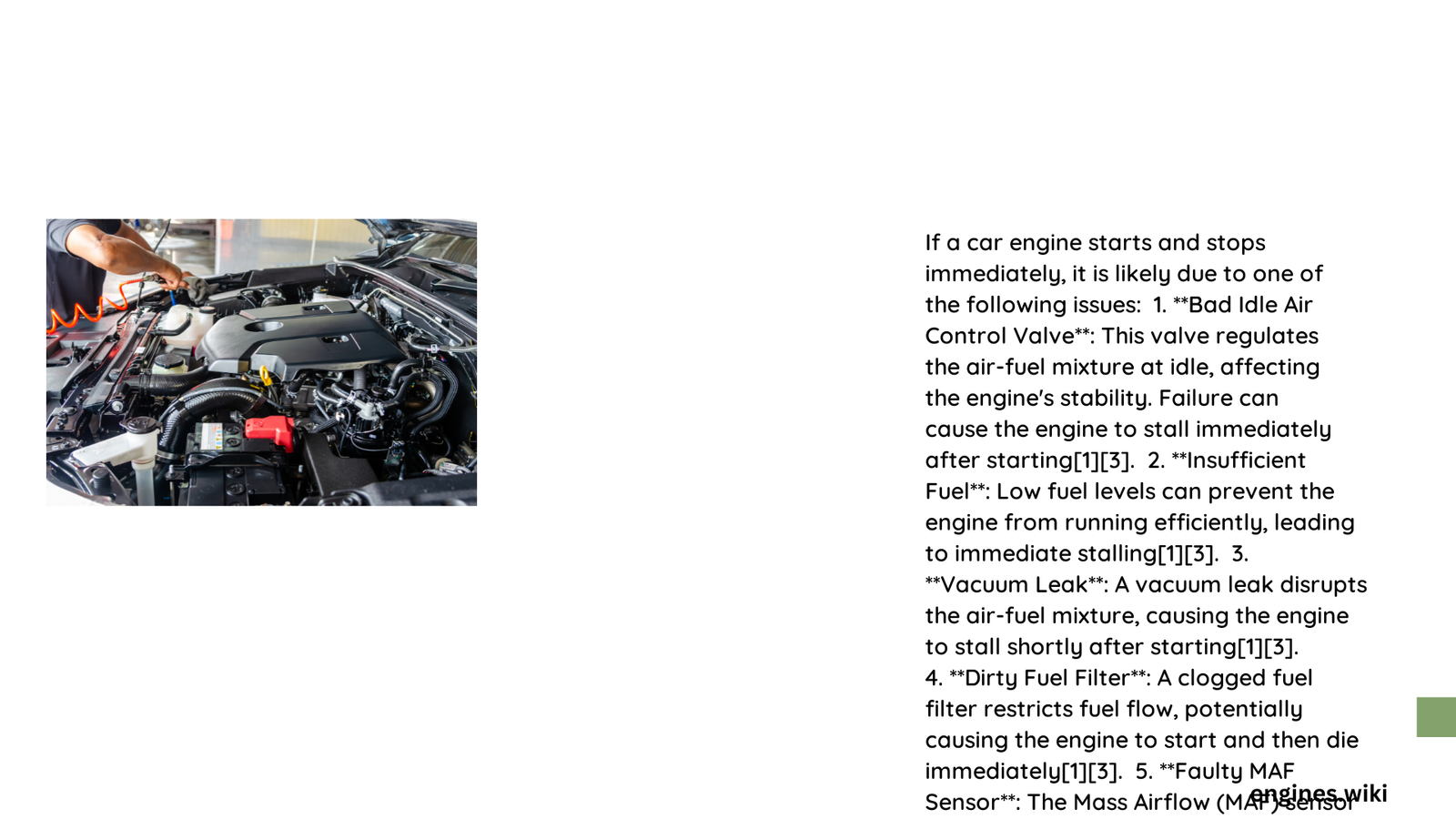When a car engine starts and abruptly dies, it signals a critical mechanical or electrical issue that demands immediate attention. Modern vehicles rely on complex interconnected systems where a single malfunction can cause immediate engine shutdown, potentially leaving drivers stranded and facing potentially expensive repairs if not diagnosed promptly and accurately.
What Causes Car Engine to Start and Stop Immediately?
Why Do Electrical Systems Trigger Engine Shutdown?
Electrical system failures represent a significant contributor to car engine starts and stops immediately scenarios. Key electrical components that can cause immediate engine shutdown include:
- Battery Health Indicators
- Voltage below 12.4V
- Corroded battery terminals
- Weak battery charge capacity
-
Faulty alternator performance
-
Ignition System Complications
- Damaged spark plugs
- Worn ignition coils
- Compromised spark plug wires
- Malfunctioning ignition control module
What Role Do Fuel Systems Play in Engine Shutdown?
Fuel delivery systems are equally critical in preventing unexpected engine stops:
| Fuel System Component | Potential Issue | Diagnostic Approach |
|---|---|---|
| Fuel Pump | Low pressure output | Pressure gauge testing |
| Fuel Filter | Restricted fuel flow | Visual inspection |
| Fuel Injectors | Clogged or malfunctioning | Electronic diagnostic scan |
| Fuel Pressure Regulator | Inconsistent pressure | Pressure testing |
How Can Sensors Contribute to Engine Instability?
Sensor malfunctions can dramatically impact engine performance:
- Mass Airflow (MAF) Sensor
- Provides incorrect air volume measurements
- Disrupts air-fuel mixture calculations
-
Triggers immediate engine shutdown
-
Oxygen (O2) Sensor
- Monitors exhaust gas composition
- Faulty readings cause improper fuel management
- Leads to unpredictable engine behavior
What Diagnostic Steps Should You Take?
Recommended Troubleshooting Sequence
- Battery and Charging System Check
- Measure battery voltage
- Test alternator output
-
Inspect battery connections
-
Fuel System Evaluation
- Perform fuel pressure test
- Check fuel filter condition
-
Examine fuel injector functionality
-
Electrical System Diagnosis
- Use OBD-II scanner
- Read and interpret error codes
- Check ignition system components
When Should Professional Intervention Be Considered?
While DIY diagnostics can resolve many issues, complex problems require professional expertise:
– Persistent engine shutdown after basic troubleshooting
– Multiple system failures
– Advanced electronic system complications
– Lack of diagnostic equipment
Expert Recommendations

- Maintain regular vehicle maintenance
- Address warning signs immediately
- Use high-quality replacement parts
- Keep detailed service records
Technical Specifications for Diagnosis
Recommended Testing Parameters:
– Battery Voltage: 12.4V – 12.7V
– Fuel Pressure: 40-60 PSI
– Spark Plug Gap: 0.028-0.060 inches
– Compression: 100-150 PSI per cylinder
Conclusion
Understanding why a car engine starts and stops immediately requires systematic diagnosis, technical knowledge, and patience. By methodically investigating electrical, fuel, and sensor systems, most engine shutdown issues can be successfully resolved.
